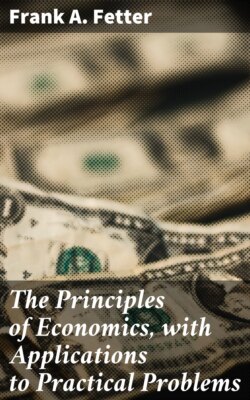Читать книгу The Principles of Economics, with Applications to Practical Problems - Frank A. Fetter - Страница 71
На сайте Литреса книга снята с продажи.
§ III. THE VALUE OF TYPICAL MONEY
ОглавлениеThe money use is added to other uses
1. The money use, historically considered, is a new use added to a good, and increases the demand for that good. The history of any particular kind of money may be traced back to a point where it was not money, since which the money use has been added gradually to the other uses. The value of the material later to become money is determined, as is that of any good, according to its marginal utility in all possible applications. No new theory is required to explain the value of this same commodity as it gradually acquires the added use of a medium of exchange. The new use influences demand for the thing just as do the other uses. What is here said must be understood as applying to typical money, which is at the same time a commodity having other uses. Other things that are not typical money come later to be used as money, under legal regulations.
The other uses continue, slightly modified by the money use
2. A good that comes to be used as money continues to have a commodity use along with the money use. When a thing is wanted for some quality that gives immediate gratification to the user, the explanation of its value is simple. Ornaments, shells, feathers, food can be seen to have a direct want-gratifying power. The money use is one that works no physical or visible change in goods, and to many minds it appears so different from other utilities that it remains quite mysterious and incomprehensible. To persons accustomed to thinking on problems of value, this case appears to be no more difficult than that of anything else having two or more uses. Cows are used for milk, for meat, and as beasts of burden. Each of these uses is logically independent as a cause of value, yet all are mutually related, the values of cattle being determined by the consideration of all their uses united into one scale of diminishing utility.
Money yields a series of rents which are the basis of its value
3. The uses of money make it a rent-bearing form of wealth. The rent that money yields is in the form of convenience and economy. This is sometimes rendered directly as psychic income, as in enabling the traveler to buy his dinner, for the money thus yields gratification just as does the carriage in which he rides. One may go for a day to the seashore without a parasol and suffer from heat, or without money and suffer from hunger. In every case where money is retained for a time in possession, there is expected from it a usufruct as great as, or greater than, can be secured from anything else for which it can be exchanged. This usufruct is a net surplus, or income, yielded by a sum of money undiminished in amount up to the moment it is spent, but meantime increasing in the gratification it will help to secure. In many cases in practical business money yields gratification only indirectly, as the objective contract rent received as interest for borrowed money in business uses, or as economic rent when the use of money in business enables one to secure a larger income. Because money yields a rent men make the sacrifice involved in keeping a stock of it on hand. On this rent is based that part of the value of money that is derived from its money use. As the use of money as a standard of deferred payment, or basis of commercial obligations, does not require that it be owned by the parties writing the contract, this use of money is a free good, a sort of social by-product of the medium of exchange. When money is in use in a community, any person may draw up contracts in terms of money, borrowing and lending, buying and selling wealth, later to be repaid in other wealth or services expressed in the circulating medium.
The general use of money is characteristic of this age
4. Money may be defined as a generally accepted material means of payment and medium of exchange. This, its primary and essential function, may appear to be less important as new modes of balancing accounts of wealth are devised. But its functions as a common denominator of values and as a standard of deferred payment are increasingly important in an advancing society. It is this expression of the value of all other things in terms of money which may well be deemed the essential characteristic of the capitalistic age. In earlier periods wealth was thought of and expressed in concrete terms; now it is expressed in money. The general use of money affects men's ways of looking at wealth and speaking of it. Without appreciating the nature and function of money, it is impossible to grasp the significance of capital in modern industry, the consideration of which we are now to enter upon.
